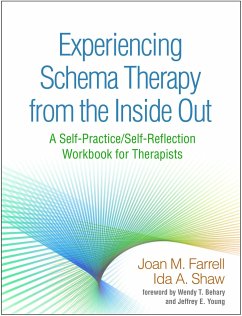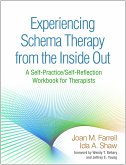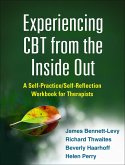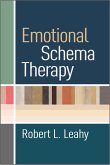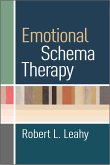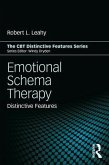Joan M. Farrell, Ida A. Shaw
Experiencing Schema Therapy from the Inside Out
A Self-Practice/Self-Reflection Workbook for Therapists
Joan M. Farrell, Ida A. Shaw
Experiencing Schema Therapy from the Inside Out
A Self-Practice/Self-Reflection Workbook for Therapists
- Gebundenes Buch
- Merkliste
- Auf die Merkliste
- Bewerten Bewerten
- Teilen
- Produkt teilen
- Produkterinnerung
- Produkterinnerung
This unique resource helps therapists build their skills in schema therapy (ST) by applying ST techniques to themselves and reflecting on the experience. Designed for use by individuals or groups, the book harnesses the power of self-practice/self-reflection (SP/SR), an evidence-based training strategy. Twenty modules take therapists step by step through using ST to address a professional or personal problem--from establishing safety and creating a self-conceptualization to implementing mode change work, including cognitive, experiential, and behavioral pattern-breaking interventions.
Andere Kunden interessierten sich auch für
![Experiencing Schema Therapy from the Inside Out Experiencing Schema Therapy from the Inside Out]() Joan M. Farrell (Indiana Universityâ Purdue University IndianapoliExperiencing Schema Therapy from the Inside Out52,99 €
Joan M. Farrell (Indiana Universityâ Purdue University IndianapoliExperiencing Schema Therapy from the Inside Out52,99 €![Experiencing ACT from the Inside Out Experiencing ACT from the Inside Out]() Dennis Tirch (United Sta The Center for Compassion Focused TherapyExperiencing ACT from the Inside Out50,99 €
Dennis Tirch (United Sta The Center for Compassion Focused TherapyExperiencing ACT from the Inside Out50,99 €![Experiencing CBT from the Inside Out Experiencing CBT from the Inside Out]() James Bennett-Levy (Australia University of Sydney)Experiencing CBT from the Inside Out52,99 €
James Bennett-Levy (Australia University of Sydney)Experiencing CBT from the Inside Out52,99 €![Emotional Schema Therapy Emotional Schema Therapy]() Robert L. Leahy (USA Weill Cornell Medical College)Emotional Schema Therapy44,99 €
Robert L. Leahy (USA Weill Cornell Medical College)Emotional Schema Therapy44,99 €![Emotional Schema Therapy Emotional Schema Therapy]() Robert L. Leahy (USA Weill Cornell Medical College)Emotional Schema Therapy68,99 €
Robert L. Leahy (USA Weill Cornell Medical College)Emotional Schema Therapy68,99 €![Experiencing Compassion-Focused Therapy from the Inside Out Experiencing Compassion-Focused Therapy from the Inside Out]() Russell L. Kolts (United States Eastern Washington University)Experiencing Compassion-Focused Therapy from the Inside Out51,99 €
Russell L. Kolts (United States Eastern Washington University)Experiencing Compassion-Focused Therapy from the Inside Out51,99 €![Emotional Schema Therapy Emotional Schema Therapy]() Robert L. LeahyEmotional Schema Therapy20,99 €
Robert L. LeahyEmotional Schema Therapy20,99 €-
-
-
This unique resource helps therapists build their skills in schema therapy (ST) by applying ST techniques to themselves and reflecting on the experience. Designed for use by individuals or groups, the book harnesses the power of self-practice/self-reflection (SP/SR), an evidence-based training strategy. Twenty modules take therapists step by step through using ST to address a professional or personal problem--from establishing safety and creating a self-conceptualization to implementing mode change work, including cognitive, experiential, and behavioral pattern-breaking interventions.
Hinweis: Dieser Artikel kann nur an eine deutsche Lieferadresse ausgeliefert werden.
Hinweis: Dieser Artikel kann nur an eine deutsche Lieferadresse ausgeliefert werden.
Produktdetails
- Produktdetails
- Verlag: Guilford Publications
- Seitenzahl: 318
- Erscheinungstermin: 8. Januar 2018
- Englisch
- Abmessung: 284mm x 210mm x 27mm
- Gewicht: 996g
- ISBN-13: 9781462535507
- ISBN-10: 146253550X
- Artikelnr.: 49226256
- Herstellerkennzeichnung
- Libri GmbH
- Europaallee 1
- 36244 Bad Hersfeld
- gpsr@libri.de
- Verlag: Guilford Publications
- Seitenzahl: 318
- Erscheinungstermin: 8. Januar 2018
- Englisch
- Abmessung: 284mm x 210mm x 27mm
- Gewicht: 996g
- ISBN-13: 9781462535507
- ISBN-10: 146253550X
- Artikelnr.: 49226256
- Herstellerkennzeichnung
- Libri GmbH
- Europaallee 1
- 36244 Bad Hersfeld
- gpsr@libri.de
Joan M. Farrell, PhD, is Codirector of the Schema Therapy Institute Midwest-Indianapolis Center and Research Director of the Center for Borderline Personality Disorder Treatment and Research, Indiana University-Purdue University Indianapolis (IUPUI). She is Adjunct Professor of Psychology at IUPUI and served for 25 years as Clinical Professor in Psychiatry at Indiana University School of Medicine, where she developed and directed an inpatient schema therapy (ST) program for borderline personality disorder (BPD). Dr. Farrell is coprincipal investigator of an international study of ST for BPD underway in five countries and was principal investigator of a study of group ST for BPD, for which she was awarded a National Institute of Mental Health grant. A Certified Schema Therapist Trainer/Supervisor in individual and group ST, she is Coordinator for Training and Certification on the Executive Board of the International Society of Schema Therapy. Dr. Farrell is the codeveloper of group ST with Ida A. Shaw, with whom she has worked since the 1980s. They provide ST training and self-practice/self-reflection workshops nationally and internationally and have written two prior books as well as numerous book chapters and research articles. Ida A. Shaw, MA, is Codirector of the Schema Therapy Institute Midwest-Indianapolis Center and a Certified Schema Therapist Trainer/Supervisor in individual, group, and child/adolescent ST. She is Training Director of the Center for Borderline Personality Disorder Treatment and Research, Indiana University-Purdue University Indianapolis, and a member of the Training and Certification Advisory Board of the International Society of Schema Therapy. With a background in experiential psychotherapy and developmental psychology, Ms. Shaw is the codeveloper of group ST with Joan M. Farrell, with whom she has worked since the 1980s. They provide ST training and self-practice/self-reflection workshops nationally and internationally and have written two prior books as well as numerous book chapters and research articles. Ms. Shaw is the main clinical supervisor of an international multisite trial of group ST and supervises the practice component of additional research projects on avoidant personality disorder, dissociative disorders, complex trauma, and child/adolescent treatment.
Foreword, Wendy T. Behary and Jeffrey E. Young
1. Introducing Experiencing Schema Therapy from the Inside Out
2. The Conceptual Model of Schema Therapy
3. Guidance for Participants
4. Guidance for Facilitators
Introduction to the Workbook Modules
I. Connection and Safety: Setting the Stage for Schema Therapy
Self-Practice/Self-Reflection
Module 1. Connection and Safety
Module 2. Establishing Your Baseline
II. Understanding Your Identified Problem: Using Schema Therapy Concepts
Module 3. Understanding the Development of Your Early Maladaptive Schemas
Module 4. Stories of Childhood Experience and Assessment Imagery
Module 5. Your Schema Therapy Self-Conceptualization
III. Planning Change: Self-Monitoring, Problem Analysis, and Goals
Module 6. The Operation of Modes in Your Current Life
Module 7. Your Schema Therapy Change Plan
IV. The Beginning of Change: Mode Awareness and Mode Management
Module 8. Awareness of Your Maladaptive Coping Modes
Module 9. A Management Plan for Your Maladaptive Coping Modes
Module 10. Awareness of Your Dysfunctional Critic Modes
Module 11. A Management Plan for Your Dysfunctional Critic Modes
Module 12. Strengthening Your Healthy Adult Mode
Module 13. Reviewing Progress and Planning Further Change
V. Experiential Mode Change Work
Module 14. Awareness of Your Angry or Impulsive/Undisciplined Child Mode
Module 15. Awareness of Your Vulnerable Child Mode
Module 16. A Management Plan for Your Vulnerable Child Mode
Module 17. Fighting Your Dysfunctional Critic Modes
Module 18. Healing Your Vulnerable Child Mode
VI. Maintaining and Strengthening Change
Module 19. Finding and Strengthening Your Happy Child Mode
Module 20. Strengthening Your Access to the Healthy Adult Mode
VII. Summary Self-Reflective Questions
References
1. Introducing Experiencing Schema Therapy from the Inside Out
2. The Conceptual Model of Schema Therapy
3. Guidance for Participants
4. Guidance for Facilitators
Introduction to the Workbook Modules
I. Connection and Safety: Setting the Stage for Schema Therapy
Self-Practice/Self-Reflection
Module 1. Connection and Safety
Module 2. Establishing Your Baseline
II. Understanding Your Identified Problem: Using Schema Therapy Concepts
Module 3. Understanding the Development of Your Early Maladaptive Schemas
Module 4. Stories of Childhood Experience and Assessment Imagery
Module 5. Your Schema Therapy Self-Conceptualization
III. Planning Change: Self-Monitoring, Problem Analysis, and Goals
Module 6. The Operation of Modes in Your Current Life
Module 7. Your Schema Therapy Change Plan
IV. The Beginning of Change: Mode Awareness and Mode Management
Module 8. Awareness of Your Maladaptive Coping Modes
Module 9. A Management Plan for Your Maladaptive Coping Modes
Module 10. Awareness of Your Dysfunctional Critic Modes
Module 11. A Management Plan for Your Dysfunctional Critic Modes
Module 12. Strengthening Your Healthy Adult Mode
Module 13. Reviewing Progress and Planning Further Change
V. Experiential Mode Change Work
Module 14. Awareness of Your Angry or Impulsive/Undisciplined Child Mode
Module 15. Awareness of Your Vulnerable Child Mode
Module 16. A Management Plan for Your Vulnerable Child Mode
Module 17. Fighting Your Dysfunctional Critic Modes
Module 18. Healing Your Vulnerable Child Mode
VI. Maintaining and Strengthening Change
Module 19. Finding and Strengthening Your Happy Child Mode
Module 20. Strengthening Your Access to the Healthy Adult Mode
VII. Summary Self-Reflective Questions
References
Foreword, Wendy T. Behary and Jeffrey E. Young
1. Introducing Experiencing Schema Therapy from the Inside Out
2. The Conceptual Model of Schema Therapy
3. Guidance for Participants
4. Guidance for Facilitators
Introduction to the Workbook Modules
I. Connection and Safety: Setting the Stage for Schema Therapy
Self-Practice/Self-Reflection
Module 1. Connection and Safety
Module 2. Establishing Your Baseline
II. Understanding Your Identified Problem: Using Schema Therapy Concepts
Module 3. Understanding the Development of Your Early Maladaptive Schemas
Module 4. Stories of Childhood Experience and Assessment Imagery
Module 5. Your Schema Therapy Self-Conceptualization
III. Planning Change: Self-Monitoring, Problem Analysis, and Goals
Module 6. The Operation of Modes in Your Current Life
Module 7. Your Schema Therapy Change Plan
IV. The Beginning of Change: Mode Awareness and Mode Management
Module 8. Awareness of Your Maladaptive Coping Modes
Module 9. A Management Plan for Your Maladaptive Coping Modes
Module 10. Awareness of Your Dysfunctional Critic Modes
Module 11. A Management Plan for Your Dysfunctional Critic Modes
Module 12. Strengthening Your Healthy Adult Mode
Module 13. Reviewing Progress and Planning Further Change
V. Experiential Mode Change Work
Module 14. Awareness of Your Angry or Impulsive/Undisciplined Child Mode
Module 15. Awareness of Your Vulnerable Child Mode
Module 16. A Management Plan for Your Vulnerable Child Mode
Module 17. Fighting Your Dysfunctional Critic Modes
Module 18. Healing Your Vulnerable Child Mode
VI. Maintaining and Strengthening Change
Module 19. Finding and Strengthening Your Happy Child Mode
Module 20. Strengthening Your Access to the Healthy Adult Mode
VII. Summary Self-Reflective Questions
References
1. Introducing Experiencing Schema Therapy from the Inside Out
2. The Conceptual Model of Schema Therapy
3. Guidance for Participants
4. Guidance for Facilitators
Introduction to the Workbook Modules
I. Connection and Safety: Setting the Stage for Schema Therapy
Self-Practice/Self-Reflection
Module 1. Connection and Safety
Module 2. Establishing Your Baseline
II. Understanding Your Identified Problem: Using Schema Therapy Concepts
Module 3. Understanding the Development of Your Early Maladaptive Schemas
Module 4. Stories of Childhood Experience and Assessment Imagery
Module 5. Your Schema Therapy Self-Conceptualization
III. Planning Change: Self-Monitoring, Problem Analysis, and Goals
Module 6. The Operation of Modes in Your Current Life
Module 7. Your Schema Therapy Change Plan
IV. The Beginning of Change: Mode Awareness and Mode Management
Module 8. Awareness of Your Maladaptive Coping Modes
Module 9. A Management Plan for Your Maladaptive Coping Modes
Module 10. Awareness of Your Dysfunctional Critic Modes
Module 11. A Management Plan for Your Dysfunctional Critic Modes
Module 12. Strengthening Your Healthy Adult Mode
Module 13. Reviewing Progress and Planning Further Change
V. Experiential Mode Change Work
Module 14. Awareness of Your Angry or Impulsive/Undisciplined Child Mode
Module 15. Awareness of Your Vulnerable Child Mode
Module 16. A Management Plan for Your Vulnerable Child Mode
Module 17. Fighting Your Dysfunctional Critic Modes
Module 18. Healing Your Vulnerable Child Mode
VI. Maintaining and Strengthening Change
Module 19. Finding and Strengthening Your Happy Child Mode
Module 20. Strengthening Your Access to the Healthy Adult Mode
VII. Summary Self-Reflective Questions
References

